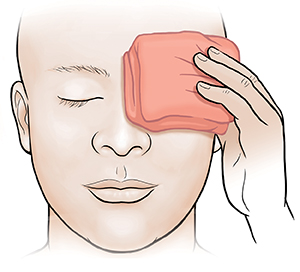A
B
C
D
E
F
G
H
I
J
K
L
M
N
O
P
Q
R
S
T
U
V
W
X
Y
Z
Click a letter to see a list of medical procedures beginning with that letter.
Click 'Back to Intro' to return to the beginning of this section.
Understanding Red Eye: Treating the Infection
Eye infections are most often caused by viruses or bacteria. Sometimes they are caused by an infection in another part of your body. Many eye infections can spread from person to person, which means that they are contagious.
Viruses
Viral infections can happen in one or both eyes. Sometimes they start in one eye and spread to the other eye. They can affect your eyes when you have a cold, flu, or other virus. In most cases, there is a teary, watery discharge. Your eyes may burn or itch. Your eyelids may be puffy and sore.
Treating viral infections:
-
Most viral infections go away on their own in 1 to 3 weeks.
-
Artificial tears and warm cloths can ease your symptoms.
-
Your healthcare provider may also prescribe steroid eye drops.
-
To keep the infection from spreading, don’t touch your eyes.
-
Don’t share bedding or towels.
Bacteria
Bacterial infections often happen in one eye. A thick, smelly discharge is common. Bacterial infections can be long-term (chronic) and may cause serious damage to your eye. Often they are caused by bacteria in other parts of your eye or body. See your healthcare provider as soon as you notice any symptoms.
Treating bacterial infections:
-
Your healthcare provider will prescribe antibiotic eye drops or ointment to kill the bacteria.
-
Use warm compresses to keep the eyelids clean.
-
To keep the bacteria from spreading, use a separate towel or tissue for each eye.
-
Don’t touch or rub your eyes.
-
Don`t share bedding or towels.
 |
| A warm compress can help relieve red eye symptoms. |
Very contagious
Eye infections can be very contagious. They spread quickly through daycare centers and classrooms. You may be asked to keep your child home as long as they have any discharge. Wash your hands and your child’s hands often. This can help stop infection and the spread of infection.
Online Medical Reviewer:
Janet Campbell RN BSN
Online Medical Reviewer:
Whitney Seltman MD
Date Last Reviewed:
9/1/2025
© 2000-2025 The StayWell Company, LLC. All rights reserved. This information is not intended as a substitute for professional medical care. Always follow your healthcare professional's instructions.